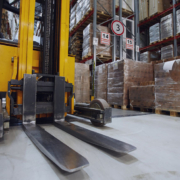Counterfeit medications have been responsible for at least 290,000 deaths annually worldwide. Material shortages, tariff changes, and labor shortages have all contributed to recurring drug shortages across the world, costing drug companies over 8.6 million hours to remediate, risking the lives of millions, and creating space for counterfeits to enter the market. Unfortunately, minimizing counterfeits remains a challenge, especially during the transportation process.
New regulations under the Drug Supply Chain Security Act (DSCSA) aim at minimizing counterfeits by requiring serialized identification numbers for individual products; however, distributors would then have to scan individual barcodes to verify medications, increasing delays and costs on an already-strained system. To stay ahead of shortages, hospitals and pharmacies tend to overstock medications, holding an average of 180 days’ worth of finished goods that may not get used, ultimately resulting in wasted storage space, costs, and medication – further contributing to shortages that feed the vicious cycle of medical counterfeits.
How are pharmaceutical supply chains reacting?
By 2023, the FDA will require all medical products to contain a second 2-D barcode specifying a unique serialized identification number. While warehouses can disassemble pallets to individually scan medications, RFID technology is currently being enhanced to simplify the process. Although traditional RFID applications are incompatible with metals and liquids– both normally present in pharmaceutical supply chains – Zebra’s adaptable RFID solutions tackle the challenges of medication tracking by integrating…
- Custom-built lags and RFID labels – Every operation is unique, which is why RFID labels should be tailored to meet the obstacles of your facility such as poor lack of air space inside containers, metal shelves, etc. In doing so, businesses can better track in-transit products.
- On-demand RFID printing and encoding – Modern Zebra printers like the ZT411 are equipped with optional RFID encoding, allowing operations to streamline enterprise printing from one all-encompassing system.
- Highly secured mobile computers – Lastly, to ward off counterfeit behavior and stock tampering, mobile computers should be equipped with security-focused tools, recurring security patches, and higher encryption levels. Android handhelds like the MC3330xR maximize data security with varying authentication levels to enable safe data sharing, so T&L teams, distributors, and hospitals/pharmacies know when and where to expect shipments as well as how many products they will be receiving.
From metal-compatibility to challenging small sizes, protect pharmaceutical tracking with an RFID solution dedicated to expanding visibility no matter the costs. Reach out to Avalon to carefully assess your workflows and bottlenecks alongside an RFID specialist and see how you can enhance track and trace to protect your bottom line, and most importantly, your customers.











Leave a Reply
Want to join the discussion?Feel free to contribute!